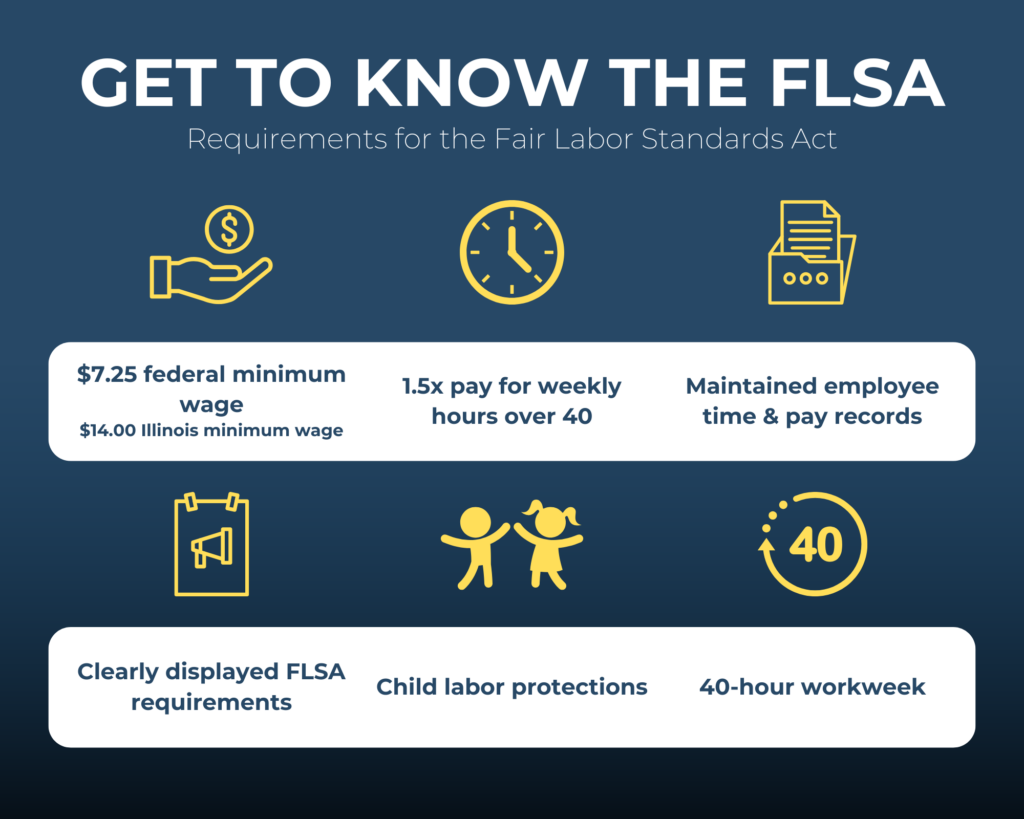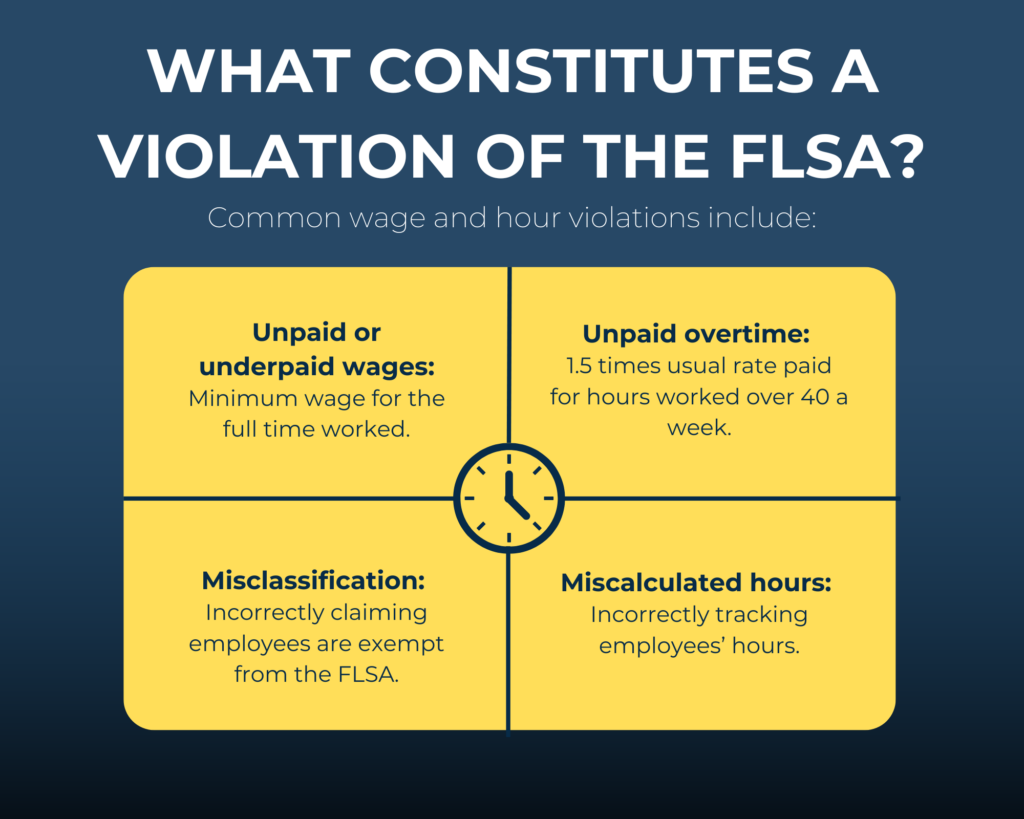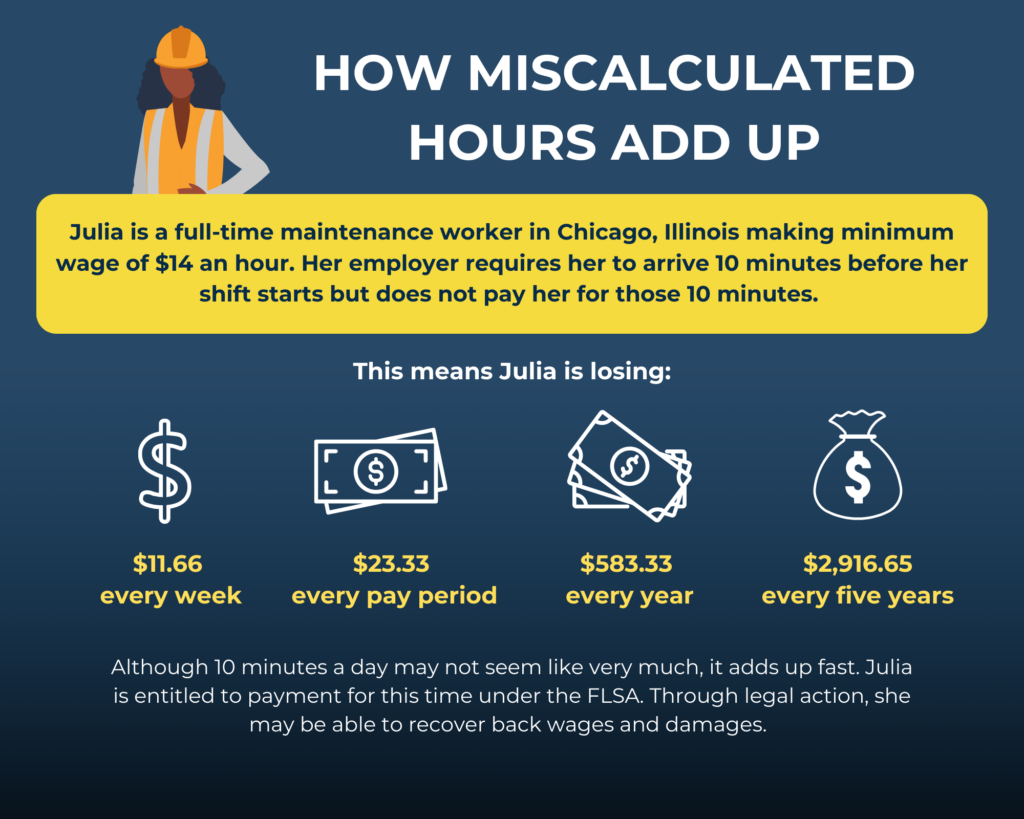Seeking Justice for Wage and Hour Violations
As an employee, you are entitled to fair pay and equitable treatment at work—and if you suspect that you are not being compensated correctly, you have options. Wallace Miller is currently accepting lawsuits against employers that have violated the Fair Labor Standards Act (FLSA).
At our firm, we understand the impact of these wage and hour issues. You depend on a reliable paycheck to support yourself and your loved ones, but some employers’ wage and hour policies may result in you receiving less than you are owed. The illegal actions of these employers often impact hundreds or even thousands of employees, and these employees can join together in collective lawsuits.
In the confusing and intricate world of FLSA and wage and hour laws, we are here to be your advocates. For a confidential and free consultation, call Wallace Miller at (312) 261-6193 or fill out our online case evaluation. We can assess your case, provide advice on the best way to proceed, and help you fight for the pay you’re entitled to.

How does the Fair Labor Standards Act (FLSA) work?
Created in 1938, the Fair Labor Standards Act requires that people be paid for their work. To that end, it defines what qualifies as work (for example, your commute doesn’t count) and sets standards for prompt payment. The law applies to full- and part-time private sector and government employees, with certain exemptions.
Employees who believe they have been denied fair payment under the FLSA can bring a collective action (a type of group lawsuit) against their employer, which makes it possible for employees to pool resources and work together to pursue recovery. This claim can be brought through the Wage and Hour Division, or employees can seek compensation through civil employment litigation.

What are wage and hour laws? Minimum wage, overtime pay, and more
The Fair Labor Standards Act and other wage laws are part of a system of federal and state laws designed to protect the rights of employees.
Federal law, through the FLSA, sets a number of workers’ rights standards for individuals who are covered under the law, including:
- A federal minimum wage of $7.25 an hour (or $2.13 an hour for tipped employees).
- A standard 40 hour workweek, defined as any consecutive seven-day period.
- Overtime pay, set at one and a half times a worker’s regular rate when they work more than 40 hours in a workweek.
- Recordkeeping requirements, including displaying an official poster with FLSA rules and keeping employee pay records.
- Child labor laws establishing that individuals must be at least 16 to work most non-agricultural jobs. These laws are designed to protect minors’ educational opportunities and prevent them from taking positions that are detrimental to their well-being.
- Protection from retaliation for actions taken by employees to defend their rights, including filing a complaint about pay.

In addition to federal rules, state laws may provide additional regulations for minimum wage, mandated breaks, overtime pay requirements, workers’ compensation, and other matters. Illinois, for example, has a higher minimum wage than the federal standard, set to $14 an hour as of 2024. Some states have different child labor laws, but federal regulations that provide more protections generally take precedence.
Under the FLSA, individual employees also have a right to legal action if their employer violates the law. These claims are typically investigated by the Wage and Hour Division of the U.S. Department of Labor. Each state will also have its own Department of Labor to enforce its specific labor laws.
Who qualifies under the FLSA?
Employers are covered by the FLSA if they:
- Have annual sales of more than $500,000, or
- Conduct interstate commerce.
Interstate commerce is defined broadly to include any communication with someone from another state or country. As a result, nearly every employer is subject to FLSA.
In addition to coverage policy, some categories of employees are exempt from FLSA protection. Your job title does not determine whether you’re eligible—instead, employees qualify for FLSA based on three categories:
 Job duties: Professional workers are generally exempt, including employees who work in executive, administrative, and professional positions and highly compensated employees.
Job duties: Professional workers are generally exempt, including employees who work in executive, administrative, and professional positions and highly compensated employees.- Salary basis: Salaried employees are usually exempt from the FLSA. There are some exceptions, but they are narrow and limited.
- Pay rate: Employees may be exempt if they earn more than $844 a week as a salaried employee. This number is set to increase as of January 2025. This ceiling only applies to salaried employees, not employees paid by the hour.
These exempt workers don’t qualify for FLSA benefits, including additional pay for overtime hours. Nonexempt employees—workers who do qualify for the FLSA—are typically paid hourly and work in blue collar and pink collar fields.
The FLSA also has several industry- and job-specific exemptions. Individuals including farmworkers on small farms, seasonal workers, sales workers who receive commissions, truck drivers, and mechanics don’t qualify for protections and benefits under federal law.
Employees or independent contractors?
One of the most common types of FLSA violations is misclassification—incorrectly labeling a nonexempt employee as an exempt employee or independent contractor and withholding the benefits they deserve.
The distinction between an employee and an independent contractor can be confusing. The Wage and Hour Division defines independent contractors as “workers who, as a matter of economic reality, are not economically dependent on an employer for work and are in business for themselves.”
In order to determine whether someone is an employee or an independent contractor, the Department of Labor looks at multiple factors of their situation in order to determine whether the worker is in charge of their own business (and therefore an independent contractor) or not.
This distinction can be confusing—and unscrupulous or careless employers can take advantage of it. An experienced wage and hour lawyer can assess your situation and help determine whether you’ve been misclassified and denied FLSA protections under minimum wage laws.

How do you sue your employer for an FLSA violation?
The FLSA outlines a process for bringing collective action if its policies are violated. Claims brought under the Fair Labor Standards Act are similar to class actions, but only those who join the lawsuit—called opt-in plaintiffs—can recover damages or lost wages. After a court has granted conditional certification of a collective action, the plaintiffs and their lawyers will contact other employees who may have a claim to determine whether they want to sign onto the lawsuit and recover their lost wages.
Although wage and hour violations can lead to criminal charges, relief is most often monetary. The FLSA allows for the recovery of double back pay, or damages in an amount equal to the unpaid wages. In addition to federal claims, plaintiffs can also seek relief through state wage and hour laws. Some states offer more protection than others—Illinois, New York, and California, for example, have very strong labor laws.
Wage and hour violations lawsuits often result in a settlement, as negotiating is usually cheaper than going through an expensive and time-consuming trial process. After the settlement is awarded and attorneys’ fees are deducted, the remainder of the award will be divided among the class.
What constitutes a violation of the FLSA?

Despite federal and state regulations, some employers still try to find loopholes to underpay their employees. Some common wage and hour violations include:
- Unpaid or underpaid wages: All employees should receive at least minimum wage as set by federal or state laws for the full time they work.
- Unpaid overtime pay: All nonexempt employees who work more than 40 hours in a workweek are entitled to overtime wages at a rate of 1.5 times their usual rate. This is federal law and cannot be waived, regardless of whether your employer has you sign an agreement to that effect.
- Misclassification: Some employers may wrongly classify their employees as exempt workers or independent contractors, depriving them of what they are owed in minimum wage and overtime pay. This is one of the most common wage and hour law violations.
- Miscalculated hours: Employers may incorrectly track their employees’ hours worked, leading to underpayment.
- Denied bona fide meal periods: Non-exempt employees are entitled to a break during their workday under the FLSA. If employers require employees to continue to work during their lunch period or require employees to clock out for lunch while still working, employees lose wages they are legally owed.
If you haven’t received the pay you’re entitled to for these or other reasons, you may be eligible to participate in an FLSA lawsuit. Although cases like these can be complicated and time-consuming, it’s likely that employers who violated the rights of one employee have violated labor laws across the board. In cases like these, a wage and hour violation attorney can help you bring collective action against the organization and make back the money you’re owed.
How can an employment lawyer help in my FLSA case?
Wage and hour violation lawsuits are built on a complicated system of federal and state laws, as well as almost a hundred years of court interpretations. In the face of such a complex legal framework, it can be difficult to find out if your rights have been violated or decide the best way to proceed.
A dedicated employment attorney with experience in employment laws can help you find out if you’re not being paid fairly, advise on whether a collective action is the best option for your situation, and keep you informed on your legal rights.
How much does it cost to hire an FLSA attorney?
At Wallace Miller, we understand how stressful it can be to not be paid fairly for your work. We operate on a contingency fee model, which means there are absolutely no out-of-pocket fees. Our attorneys and legal team only get paid if you do, through a successful verdict or settlement in your case.

Our FLSA lawsuits
Our attorneys are currently working on a number of FLSA actions, including cases against Ultimate Medical Academy and American Family Insurance.
In the case against Ultimate Medical Academy, we are working with opposing counsel to determine how many people may have been affected and the extent of compensation employees may be owed. Our team will file a motion for conditional certification in the near future, and if the motion is approved by the court, the other employees who have a claim will receive a notice and the option to join the lawsuit.
Wallace Miller is currently seeking additional opt-in plaintiffs for our lawsuit against American Family Insurance. If you or someone you know has been employed by American Family as a call center employee or customer service representative, you may be owed backpay and additional damages. Reach out to our team to discuss your potential case.
Talk to our FLSA team
Do you think your employer is withholding overtime pay, paying below minimum wage, or otherwise compensating you unfairly? Under federal law, it is your right to hold them accountable.
Wallace Miller has over a hundred years of combined legal experience representing individuals against the interests of big businesses and wealthy corporations. Call our office at (312) 261-6193 or fill out our online questionnaire for a free, private consultation about your case.

Left to right: Nicholas P. Kelly, Edward A. Wallace, Molly Condon Wells, Mark R. Miller, Jessica Wieczorkiewicz, Timothy E. Jackson.

